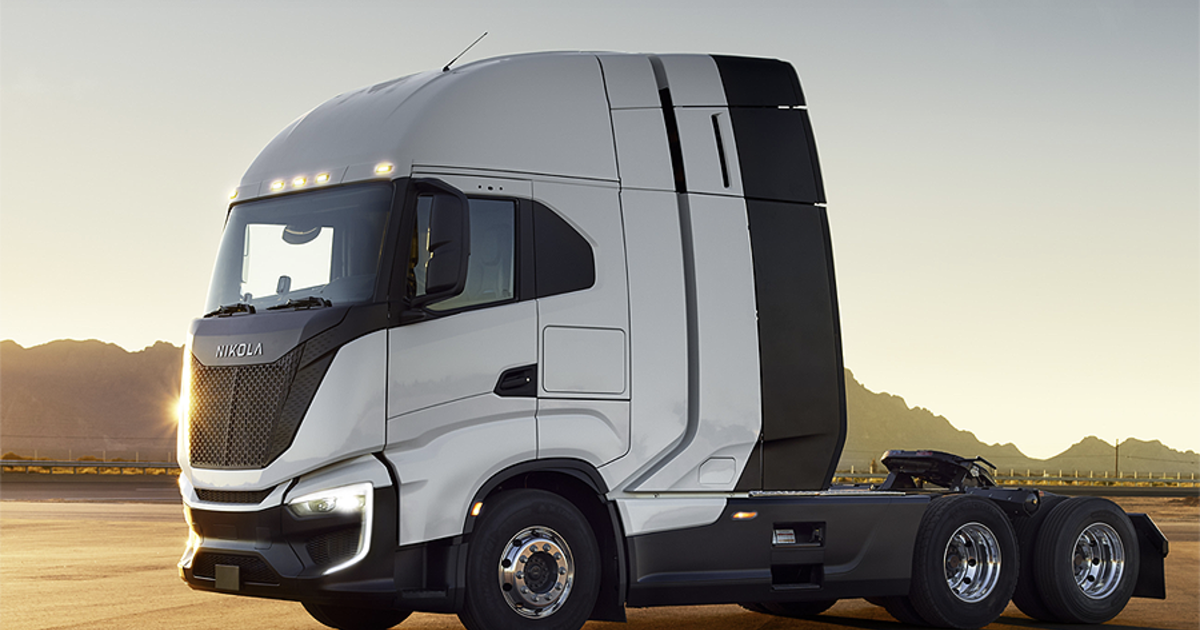
Nikola Corp.‘s plan move to ramp up production of semitrucks powered by electric batteries and hydrogen fuel cells will be costly.
The Phoenix company is expected to raise $100 million for “working capital and other general corporate purposes” through a secondary stock sale of roughly 90 million shares. The sale is expected to close by the end of the day at $1.12 a share. That’s a 20 percent discount compared with the stock’s closing price of $1.40 per unit March 30, the day it announced the offering.
Nikola, one of the first EV companies to go public via a special purpose acquisition company, or SPAC reverse merger, sold 30 million shares. The remaining 60 million shares went to Antara Capital L.P., which holds the company’s convertible bonds.
Once dubbed the “Tesla of trucking,” some industry observers viewed the capital raise unfavorably.
“It’s not a good sign if you have to sell stock at a discount; the current environment hurts them,” Michael Ramsey, transportation and mobility analyst at Gartner Inc., told Automotive News.
Startups are having trouble raising money.
“Banks are loaning money out at high-interest rates if they are making loans, and even the number of banks Nikola can turn to is also probably limited,” Ramsey said.
BTIG analyst Gregory Lewis downgraded Nikola to a “hold” from “buy” after announcing its $100 million share offering.
In the near term, Lewis said the cash will give Nikola a liquidity boost, but the company will likely struggle to keep spending down and avoid another expensive capital raise.
“Key to the longer-term growth of the hydrogen business will be partnerships to secure hydrogen molecules and the buildout of its refueling infrastructure, as the company expands its H2 station footprint to 60 by 2026 (4 today, all in California),” Lewis wrote in a report to investors.
Hydrogen production is a big part of Nikola’s business plan. The company wants to produce 300 metric tons of hydrogen daily to distribute at 60 dispensing stations in North America by 2026. The project is heavily dependent on Federal Inflation Reduction Act provisions, which include hydrogen production tax credits of up to $3 per kilogram and a U.S. Department of Energy loan guarantee program, which would provide up to $1.3 billion in financing for the project.
“We believe at Nikola, that actually our energy business is the foundation of everything, in particular hydrogen,” Nikola CEO Michael Lohscheller said Wednesday at an Automotive Press Association meeting in Detroit.
Nikola passed the first phase of the DOE’s loan application process and is currently in the second phase, Nikola CFO Kim Brady said during a quarterly financial performance conference call with investors in February.
“Ultimately once phase two is passed, then we will have a preliminary indication of these loan approvals and the size of the loan,” Brady said. “And this is important for us simply because once again it gives greater confidence for project financing.”
Brady is retiring this week and will be replaced by Nikola vice president and corporate controller Anastasiya Pasterick.
The change was part of a flurry of announcements made by the company in recent weeks.
Nikola on Wednesday said the company’s dealer network received orders for 100 Class 8 Tre hydrogen fuel cell EVs. It expects to deliver the trucks in the fourth quarter of this year.
Nikola cited the California Air Resources Board’s Hybrid and Zero-Emission Truck and Bus Voucher Incentive Project program, which offers a sales incentive from $240,000 to $288,000 and the Inflation Reduction Act’s $40,000 clean commercial vehicle tax credit as fostering the sales, Nikola said in a statement.
Nikola on Thursday signed a deal with Atlanta’s Chart Industries to build liquid hydrogen storage tanks, transport trailers and to quickly develop new mobile and modular hydrogen refueling stations.
Nikola has a checkered history. In September 2020, Hindenburg Research released its report on Nikola, saying it was “an intricate fraud.” The company acknowledged a truck appearing to cruise down a desert road under its own power in a video was not. The Securities and Exchange Commission launched an inquiry. Ultimately, Trevor Milton, Nikola’s founder, was convicted of fraud. Nikola settled with the SEC for $125 million. Milton is no longer associated with the company.
Despite Nikola’s troubled history and current cash crunch, the company looks to be the first mover for commercializing fuel cell Class 8 trucks in the U.S. But Hyundai and others are eyeing the market. Hyundai already has fuel cell trucks in operation in Europe.
“If you want to buy a fuel cell truck in 2023, you have three choices: you can buy a Nikola truck, a Nikola truck or a Nikola truck, because there is nothing else,” Lohscheller told reporters in Detroit.
But it faces intense competition from far better capitalized companies such as Daimler Truck Group’s Freightliner brand, Volvo Trucks and Tesla in the Class 8 battery electric truck market.